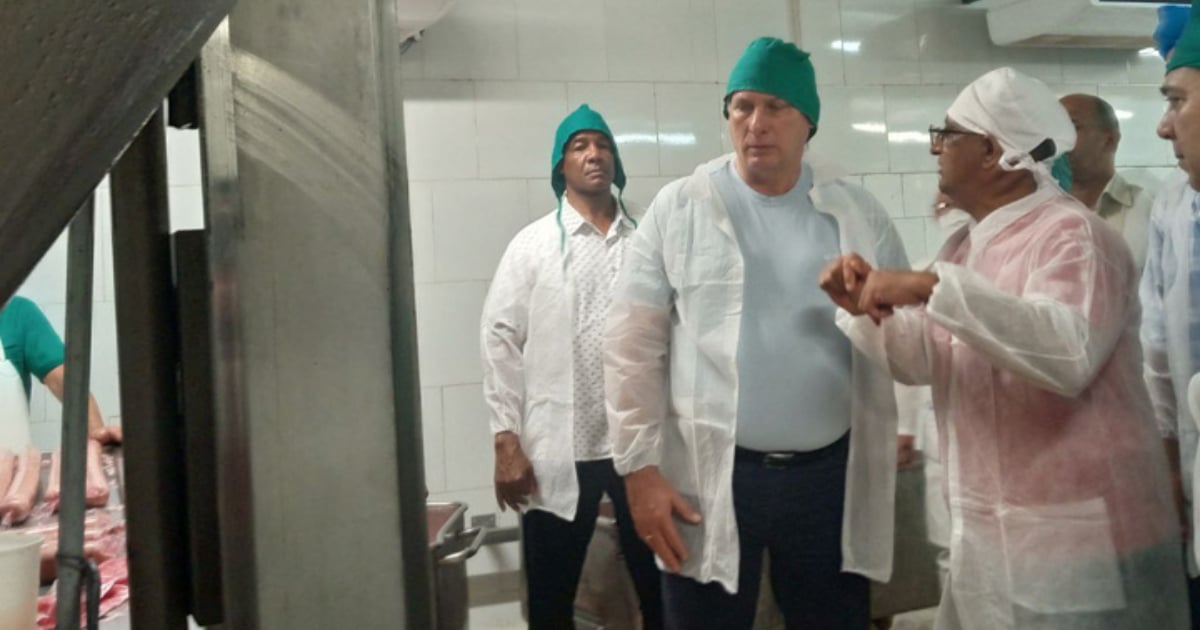
The tour of leader Miguel Díaz-Canel Bermúdez through Sancti Spíritus included a visit to the Base Business Unit Combinado Cárnico.
The state entity, according to the government, is gradually recovering thanks to productive linkages and technological innovations to keep its machinery operational. However, the reality faced by the people of Sancti Spíritus is far from the regime's optimistic statements.
Meat has become a luxury for most residents of Sancti Spíritus and throughout Cuba, due to skyrocketing prices and limited availability.
A pound of beef costs about 2,755 Cuban pesos in Cuba, pork is around 1,400 Cuban pesos, and mutton exceeds 700 pesos. This contrasts with the average monthly salaries, which are around 4,200 pesos, and pensions, which do not exceed 1,500 pesos.
During his visit, Díaz-Canel received a detailed update on the work prospects of the Meat Combined Company. Production does not come close to meeting the population's needs, as most meat products are allocated to tourism and social consumption in state-controlled institutions.
The government's alternative: Bones and byproducts for the people.
While the authorities highlight the "productive advances," the Cuban people are facing an increasingly severe food crisis.
In August, reports were made regarding the unsanitary conditions in which beef bones, legs, and bellies are sold. In Old Havana, a truck from the Artemisa slaughterhouse sold these products without refrigeration, in the sun, and without meeting minimum hygiene standards.
Prices exceeding 150 pesos per pound were still being purchased as a desperate alternative by families trying to bring something to eat to their homes.
While the Cuban people struggle to access basic foods, hotels catering to tourists are receiving tons of top-quality meat.
This policy, in effect for years, prioritizes the profits of the tourism sector over the food needs of the citizens, perpetuating an inequality that the government seems to ignore.
Díaz-Canel's visit to Sancti Spíritus serves as a reminder of the deep shortages facing the Cuban people. While there have been advances in meat production according to official figures, it remains out of reach for those who need it most.
During the time that the leader was in the mentioned province, no electricity outages were reported, according to users on social media.
Frequently Asked Questions about the Food Situation in Cuba and Díaz-Canel's Visit to Sancti Spíritus
Why is meat considered a luxury in Cuba?
Meat in Sancti Spíritus is a luxury due to its high price compared to the average salaries and pensions of citizens. A pound of beef costs around 2,755 Cuban pesos, while monthly income is about 4,200 pesos, making it practically unattainable for most of the population.
What was the purpose of Díaz-Canel's visit to the Basic Business Unit of the Combined Meat Processing?
Díaz-Canel visited the Base Business Unit of the Combined Meat Facility to observe the "productive advancements" and technological innovations. However, production does not meet the needs of the population, being primarily allocated to tourism and social consumption in state-controlled institutions.
What alternatives does the Cuban government offer in response to the meat shortage?
The Cuban government offers bones and by-products to the people. They are sold under unsanitary conditions and at high prices, reflecting the severe food crisis in the country.
How does the policy of prioritizing tourism affect the Cuban population?
The policy of prioritizing tourism creates an obvious food inequality. Hotels receive top-quality meat, while citizens face serious challenges in accessing basic food items.
Filed under: